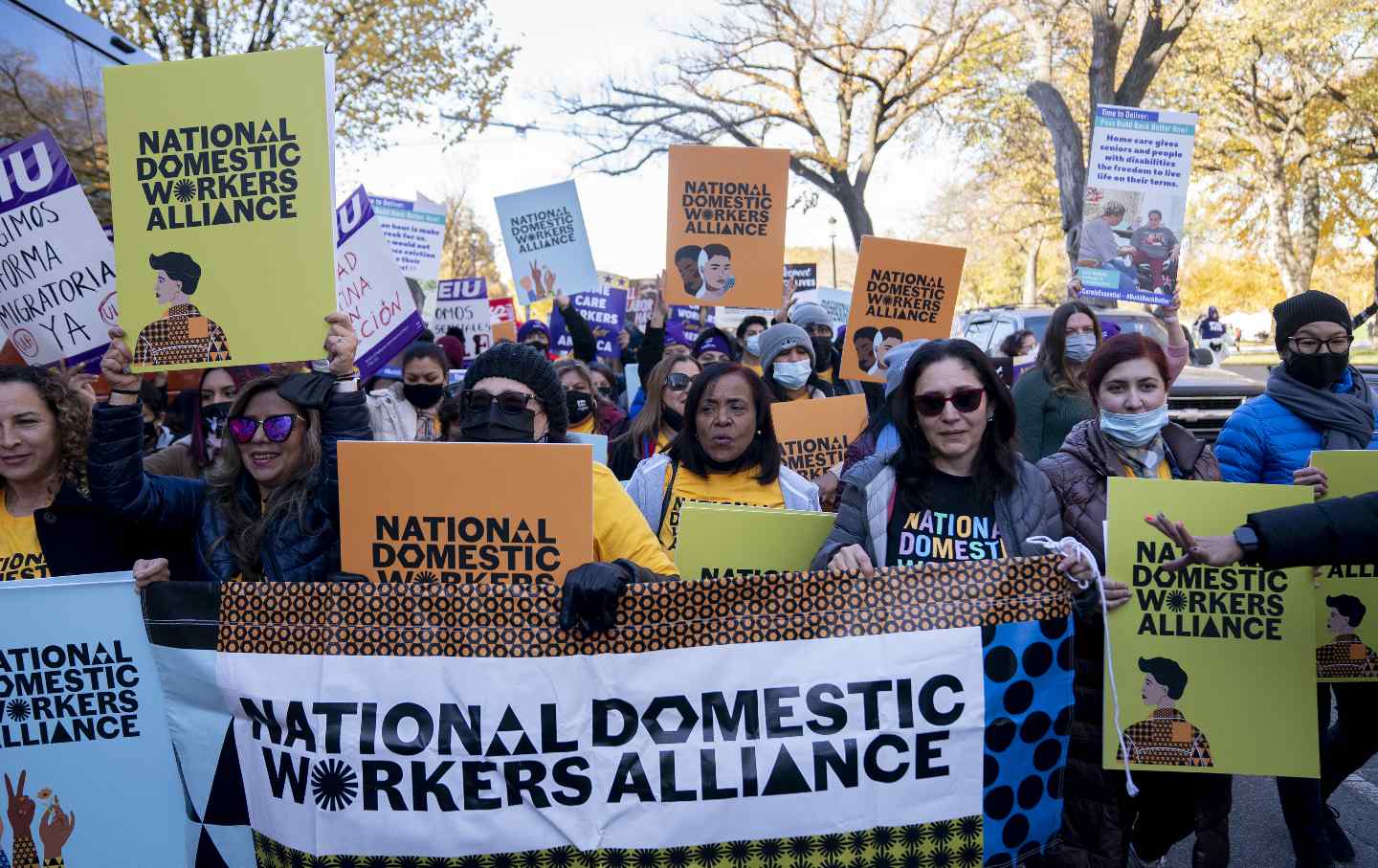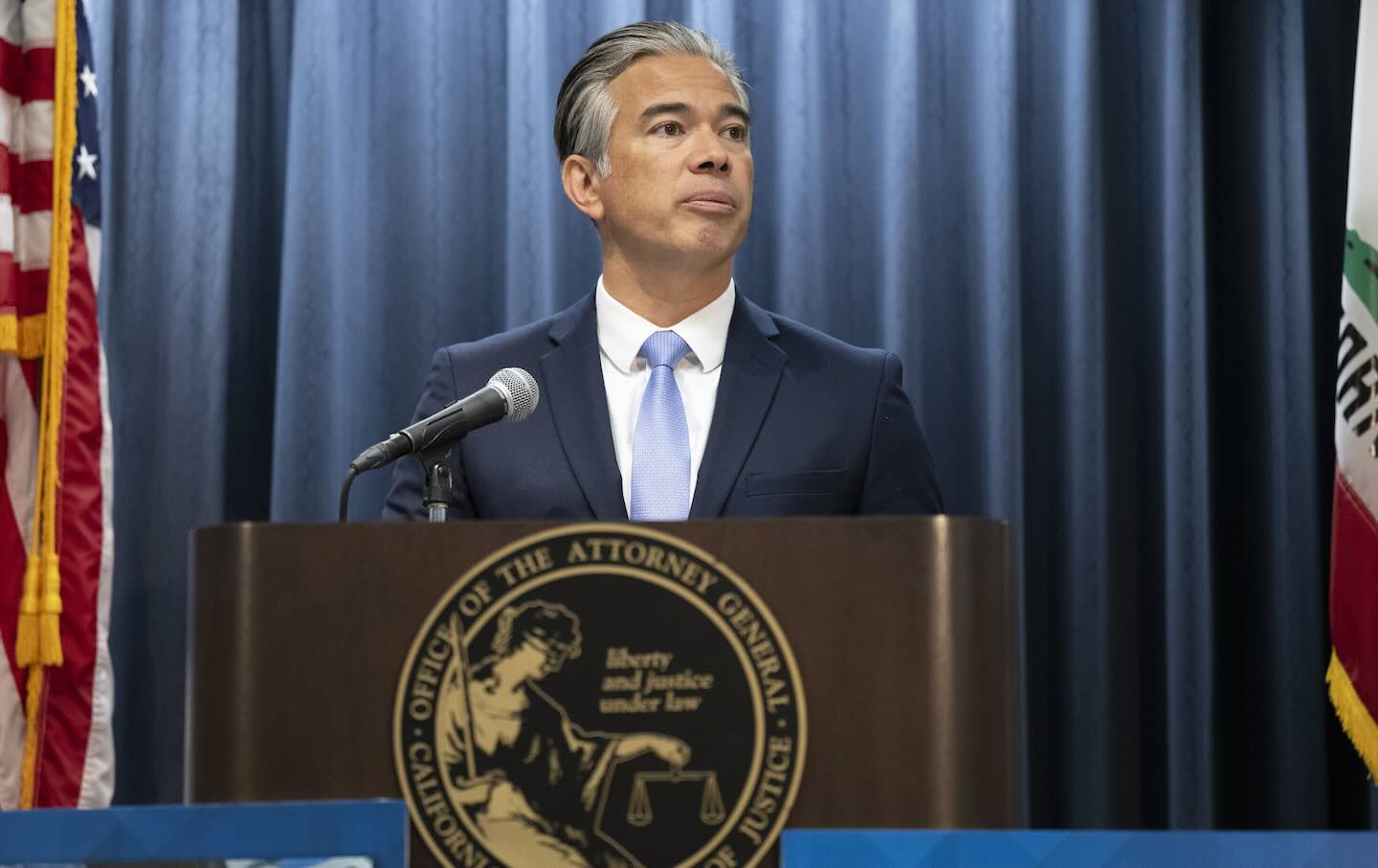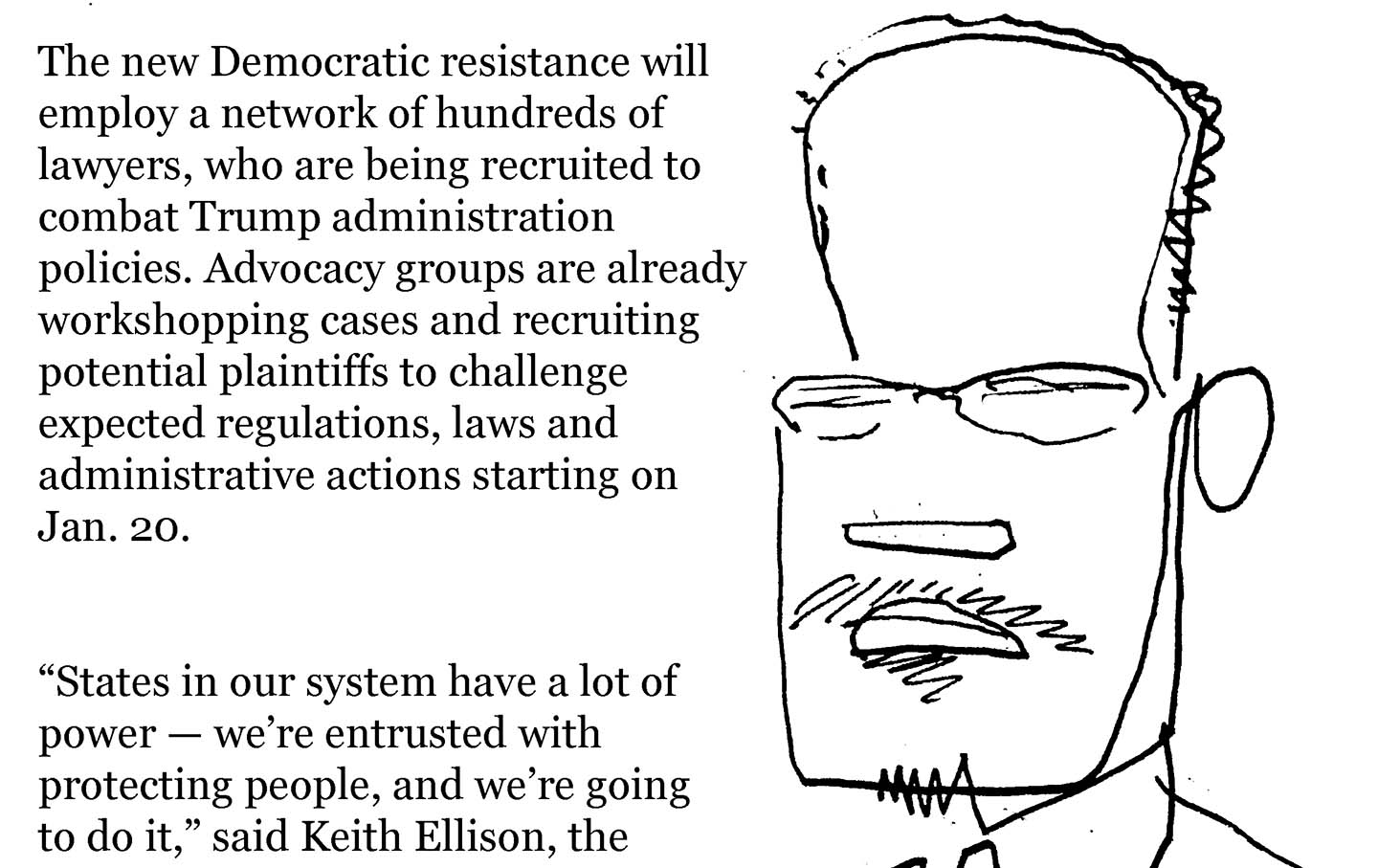Domestic Worker Bills of Rights Have Passed Across the Country. What Has Changed?
Around 90 percent of domestic workers in Massachusetts did not seek help when their rights were violated. “If we have a law that nobody knows, that means nobody is using it.”

Demonstrators hold “National Domestic Workers Alliance” signs in Washington, D.C., in 2021.
(Stefani Reynolds / Getty)Around 20 years ago, Julia found a job as a nanny with what seemed to be the perfect family. Having arrived in Connecticut from Ecuador a few years earlier, she was grateful to have secured employment, and the family seemed like a particularly great match: The mother was fluent in Spanish and the kids wanted to learn it.
But soon, the job presented problems for Julia, who uses a pseudonym because of confidentiality agreements with previous employers and her immigration status. She often worked long hours on low wages. She didn’t receive overtime or lunch breaks. Family members often screamed at her. “There was no consideration of if you were human,” said Julia. “I thought, ‘Why did you give me that treatment? Why did you yell at me?’ But you cannot say all those things because you are afraid. You need that job.”
After the mother demanded that Julia start cooking for the family, which she was not comfortable with, Julia was fired. Six months later, the family asked her to come back, but having already secured another job, Julia declined. And then the family retaliated. She heard from a number of people that the family was spreading false information about her and telling other families that they shouldn’t hire her. “It was a nightmare.”
At that time, it’s unlikely that such treatment was illegal. Domestic workers, a group that includes house cleaners, nannies, and care workers, have long been excluded from most labor protections. Over the last 15 years, three cities and 10 states, including Connecticut, have sought to change that, passing a “Domestic Worker Bill of Rights,” which often include policies for mandatory written contracts, paid time off, overtime, and discrimination protections. A national bill for a Domestic Workers’ Bill of Rights was also introduced in Congress in 2021, and is set to be re-introduced this year. These laws have aimed to better regulate a type of employer-employee relationship that has for centuries been informal, unsupervised, and—consequently—plagued by abuse.
It’s unclear if these bills of rights have tangibly affected the realities of domestic workers. There is still a lack of knowledge about the legislation among both employers and employees, fear from workers about asserting their rights, and inadequate investigation and punishment of violations. These issues have made enforcement difficult, and domestic workers often continue to work without protections.
A study released earlier this year by the Boston College Law School Civil Rights Clinic and the Brazilian Worker Center in Massachusetts—where one of most extensive domestic worker bills of rights was passed in 2014—found that 75 percent of domestic workers and half of employers in the state “had little to no knowledge” of the bill.
According to the report, employers frequently failed to provide terms and working conditions mandated by the law, such as written contracts, overtime, and lunch breaks; meanwhile, 90 percent of domestic workers in the state reported not seeking help when they thought their rights were violated. “If we have a law that nobody knows, that means nobody is using it. If we have a law that you know, but you are very afraid of speaking up, it’s useless,” said Lidia Ferreira, a worker rights organizer at Brazilian Women’s Group, a Boston-based community organization whose members are largely domestic workers.
When the National Labor Relations Act was passed in 1935, granting private sector employees the right to unionize, domestic workers were excluded. Three years later, the Fair Labor Standards Act introduced the right to overtime pay—except for live-in domestic workers. Since then, bills on the state level—setting minimum wages and workplace safety protections—similarly leave out domestic workers.
In Illinois, domestic workers were included in the hourly minimum wage requirements in 2016, along with a mandated day of rest per week. But the law is not being followed, according to Ania Jakubek, a domestic rights organizer for worker organization Arise Chicago. “Workers still think it’s okay to be paid by day instead of per hour. They still think it’s okay to work seven days a week,” she said. “Often people are just being simply abused. That’s how it was before we had the Domestic Worker Bill of Rights.”
Organizers report that many workers and employers simply don’t know the protections workers are owed. But there are also other, more complicated obstacles to making sure workers have the protections given to them by law. Many workers who know about the protections are still afraid to ask employers for things like a written contract, breaks, and changes in working conditions. “Not having any rights for so long has made a lot of caregivers scared. They are fearful,” said Abby Ruiz, a nanny in Philadelphia.
According to a 2022 report from the Economic Policy Institute, a third of all domestic workers were born outside the United States and many are undocumented. For these workers, the risk of being reported to ICE or discovered through interaction with the government makes it incredibly difficult to speak up, Ferreira said. That fear increased dramatically after Donald Trump was elected, said Megan Whelan, deputy director of the California Domestic Workers Coalition.
Domestic workers are often in precarious financial situations, and losing one’s job after filing a report or requesting different working conditions is often a terrifying prospect. According to the EPI report, the median annual earnings for domestic workers is $15,980, and they are three times more likely to be in poverty than other workers.
Popular
“swipe left below to view more authors”Swipe →Like the retaliation campaign Julia experienced, falling out with an employer doesn’t just mean the loss of that job but the potential loss of future employment from other families and homeowners in the area. “Domestic work is very reputational,” said Nicole Kligerman, director of the Pennsylvania chapter of the National Domestic Workers Alliance. When employers spread negative information about workers, it becomes very difficult for a worker to find employment in the future. “The employer has so much more power within society.”
As a result, workers are often afraid to file complaints with enforcement agencies. “When a worker is fired for asking for her rights, everyone knows about that immediately. It has a very chilling effect across the domestic worker community.” Between 2014 and 2022, the Massachusetts Attorney General’s Office received only 214 complaints for domestic worker rights violations, 29 of which led to enforcement actions.
But advocates assert that the responsibility cannot only fall on workers. The Massachusetts report said the Attorney General’s Office should have more outreach, including advertisements on public transportation, and extend the hours of its complaint hotline—currently open from 10 am to 4 pm on weekdays, times when workers are often working.
Some worker organizations report a glaring lack of resources for labor rights investigators. “We have a severely underfunded Office of Worker Protections,” said Kligerman, pointing to the fact that Philadelphia has one labor rights investigator for every 197,000 residents. The result is that the investigation process after a complaint is filed is far too long. In Philadelphia, it usually takes between four to eight months, according to Candace Chewning, director of the city’s Office of Worker Protections.
Many employers of domestic workers don’t realize that they qualify as employers because of the informality of the arrangements, and don’t assume the responsibility to find out what the law is. A majority of domestic worker employers are individual homeowners or families, but in some areas, more complicated employment systems are prevalent that also fail to give workers their legal rights.
In Chicago, recruiting agencies pose a particular problem. These agencies, which assign workers to employers, often take a cut of a worker’s salary—sometimes as much as two weeks’ pay. But these agencies have no responsibility for making sure workers are granted the rights they are legally owed. In fact, Jakubek said, they frequently provide contracts for employers and workers to use that don’t comply with the law, .
Among the Brazilian immigrant community in Massachusetts, many house cleaners are informally employed by so-called “schedule owners,” many of whom were previously workers themselves, who have a list of houses as clients and send their employees, frequently called “helpers,” to clean each house. These client lists are sometimes bought and sold—for as much as $100,000, Ferreira said.
In many of these situations, workers don’t have contracts, work long hours, are paid by the day rather than the hour, are not paid for transportation, and lack any kind of workers’ compensation or overtime, according to Ferreira. Since many of the provisions in the Massachusetts law are mandatory only if one employer hires a worker for over 16 hours a week, many don’t benefit from those protections, as they rotate through a variety of employers. “There are gaps in a situation in which an employee has multiple employers,” said Reena Parikh, who supervised the Massachusetts study as director of the Boston College Civil Rights Clinic.
For Katherine Eva Maich, an assistant professor of labor and employment relations at Penn State who does research on domestic work, there are stigmas about the industry that are holdovers from slavery. There are still implicit notions that domestic workers are “subservient” and that this kind of work is unskilled and should be looked down upon as women’s work. According to Maich, the fact that domestic workers are employed within a private home allows for workers to be exposed to dangerous conditions and abuse. “The really consistent thing is that exclusionary practices have remained,” she said.
Domestic workers still are not allowed to officially unionize. But building organization and solidarity is also difficult because most work occurs in individual homes, and there’s not one workplace at which workers can build support for a movement.
Despite the challenges, domestic worker organizations are widely seen as the primary tool to increase enforcement of domestic worker bills of rights. Many worker organizations hold regular training sessions for workers and employers to educate them about legislation and offer support and legal assistance to workers seeking to report a violation or mediate with their employer. According to the Massachusetts study, 40 percent of domestic workers and 31.5 percent of employers that knew about the bill of rights learned about the legislation through a worker organization—the most of any source.
Martha Herrera, a nanny and house cleaner in California said that when one of her employers refused to pay her the wages she was owed, she went to her labor organization, Mujeres Unidas y Activas, who connected her with pro bono lawyers who mediated with the employer and won Herrera her pay. “It’s not just about passing a law that is one of the best in the country but deeply financially investing in making that law work,” Kligerman said.
For Julia, who is now assisting in worker education efforts at the Connecticut Worker Center, the most important step is teaching workers about their rights. “I don’t want people to walk the same path that I walked.”
By showing up at playgrounds, library story hours, bus stations, and churches, putting out information in WhatsApp groups, and relying upon workers involved in the movement to tell other workers, these organizations have been able to expand their bases. “Enforcement and implementation of these laws continues to be a real challenge,” said Alana Eichner, codirector of the Washington, D.C., chapter of the NDWA. “Organizing is how you do that.”
We cannot back down
We now confront a second Trump presidency.
There’s not a moment to lose. We must harness our fears, our grief, and yes, our anger, to resist the dangerous policies Donald Trump will unleash on our country. We rededicate ourselves to our role as journalists and writers of principle and conscience.
Today, we also steel ourselves for the fight ahead. It will demand a fearless spirit, an informed mind, wise analysis, and humane resistance. We face the enactment of Project 2025, a far-right supreme court, political authoritarianism, increasing inequality and record homelessness, a looming climate crisis, and conflicts abroad. The Nation will expose and propose, nurture investigative reporting, and stand together as a community to keep hope and possibility alive. The Nation’s work will continue—as it has in good and not-so-good times—to develop alternative ideas and visions, to deepen our mission of truth-telling and deep reporting, and to further solidarity in a nation divided.
Armed with a remarkable 160 years of bold, independent journalism, our mandate today remains the same as when abolitionists first founded The Nation—to uphold the principles of democracy and freedom, serve as a beacon through the darkest days of resistance, and to envision and struggle for a brighter future.
The day is dark, the forces arrayed are tenacious, but as the late Nation editorial board member Toni Morrison wrote “No! This is precisely the time when artists go to work. There is no time for despair, no place for self-pity, no need for silence, no room for fear. We speak, we write, we do language. That is how civilizations heal.”
I urge you to stand with The Nation and donate today.
Onwards,
Katrina vanden Heuvel
Editorial Director and Publisher, The Nation
More from The Nation

Democrats Must Do Everything They Can to Block the Dangerous Nonprofit Bill Democrats Must Do Everything They Can to Block the Dangerous Nonprofit Bill
The House passed a bill aimed at giving the government sweeping powers to crush nonprofits and attack supporters of Palestine. Democrats need to stand firmly in its way.

California Is Ready to Go Toe to Toe With Trump 2.0 California Is Ready to Go Toe to Toe With Trump 2.0
“We’ve thought about all the possibilities, and have prepared for every one of them,” said AG Rob Bonta, “and are ready to take action when there’s any unlawful activity.”

BREAKING: Matt Gaetz Quits, and Journalism Still Matters—a Lot BREAKING: Matt Gaetz Quits, and Journalism Still Matters—a Lot
Forty-five minutes after CNN contacted Trump’s attorney general nominee about additional allegations of sexual misconduct, he was done.

The Red Wave Didn’t Hit Statehouses in This Election The Red Wave Didn’t Hit Statehouses in This Election
State-level Democrats largely held their ground, even scoring key victories in battleground states—and under Trump, that’s going to matter.

How Nominally Pro-Choice RFK Jr. Can Get Anti-Abortion Groups to Back His HHS Nomination How Nominally Pro-Choice RFK Jr. Can Get Anti-Abortion Groups to Back His HHS Nomination
He can pick a strident abortion opponent like Roger Severino, who wrote the Project 2025 chapter on HHS, as his number two.



